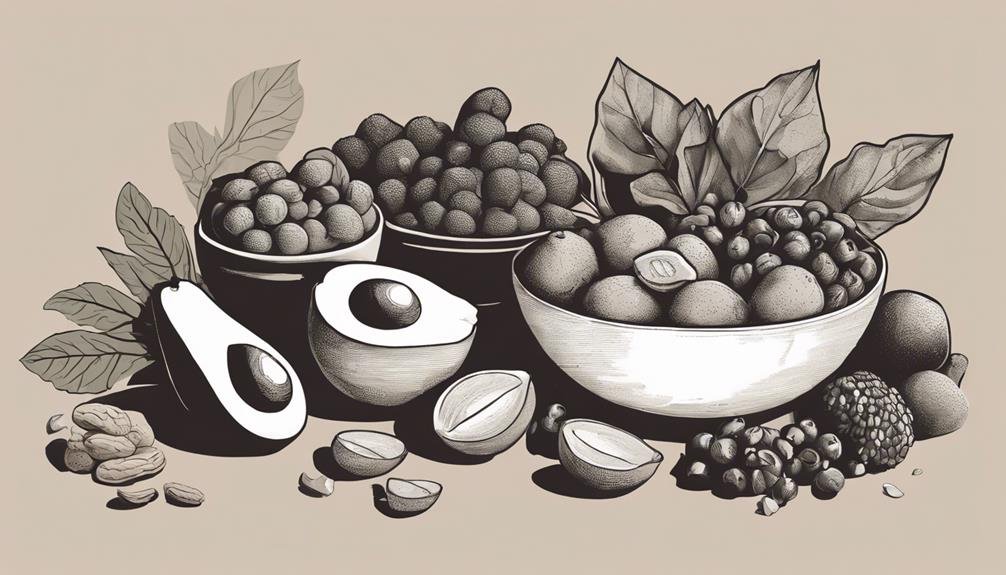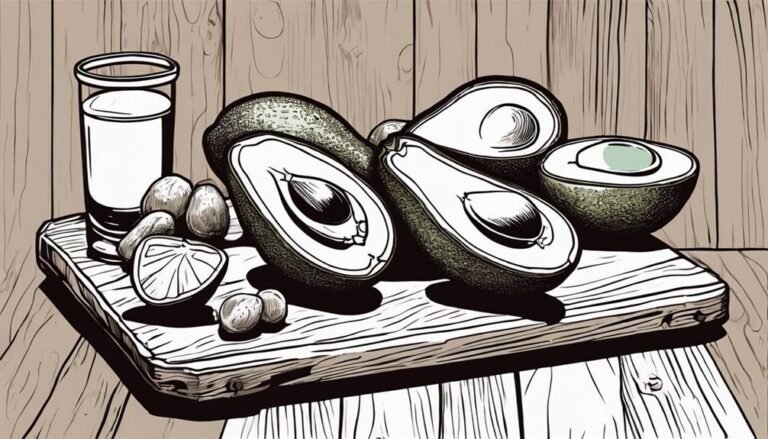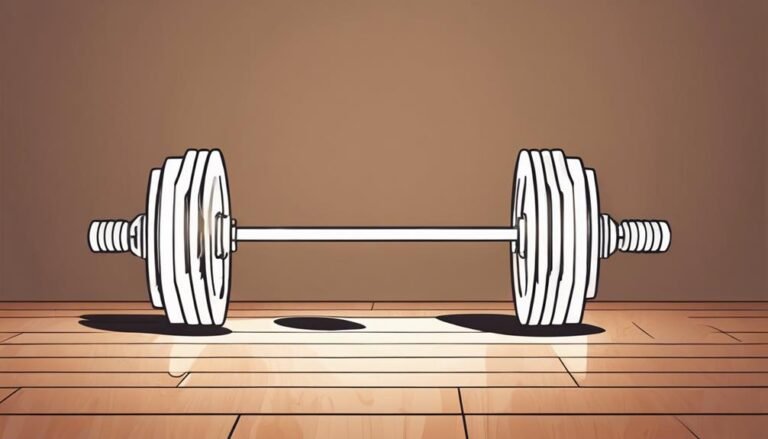What Nutrients Support Healthy Male Hormones After 40?
After 40, it's essential to focus on specific nutrients that support healthy male hormones. Make sure you're getting enough zinc, which boosts testosterone, found in oysters and pumpkin seeds. Include magnesium from leafy greens for better energy and muscle function. Don't forget omega-3 fatty acids, important for hormone production, available in fatty fish and flaxseeds. Vitamins like D, B6, and E also play a key role in hormonal health. Finally, consider herbal supplements like ashwagandha for stress management. There's more to explore about how lifestyle choices can further enhance your hormone balance and overall well-being.
Key Takeaways
- Zinc is crucial for testosterone production; sources include oysters, beef, and pumpkin seeds.
- Magnesium helps regulate cortisol and supports muscle function; found in leafy greens and nuts.
- Omega-3 fatty acids promote hormone production; include fatty fish and flaxseeds in your diet.
- Vitamins D, B6, B12, and E are essential for hormonal balance and overall vitality.
Importance of Hormone Balance
Maintaining hormone balance is essential for your overall health and well-being as you age. Hormones regulate numerous functions, from energy levels and mood to metabolism and muscle mass.
When these levels fluctuate, you might experience fatigue, weight gain, or mood swings. It's vital to recognize the signs of hormonal imbalance early, as it can greatly affect your quality of life.
Factors like stress, poor diet, and lack of exercise can further disrupt hormone levels. By prioritizing balance, you can enhance your physical and mental health.
Implementing lifestyle changes, such as regular exercise, managing stress, and ensuring adequate sleep, can help stabilize your hormones. Taking control now will pave the way for a healthier, more vibrant future.
Key Nutrients for Testosterone
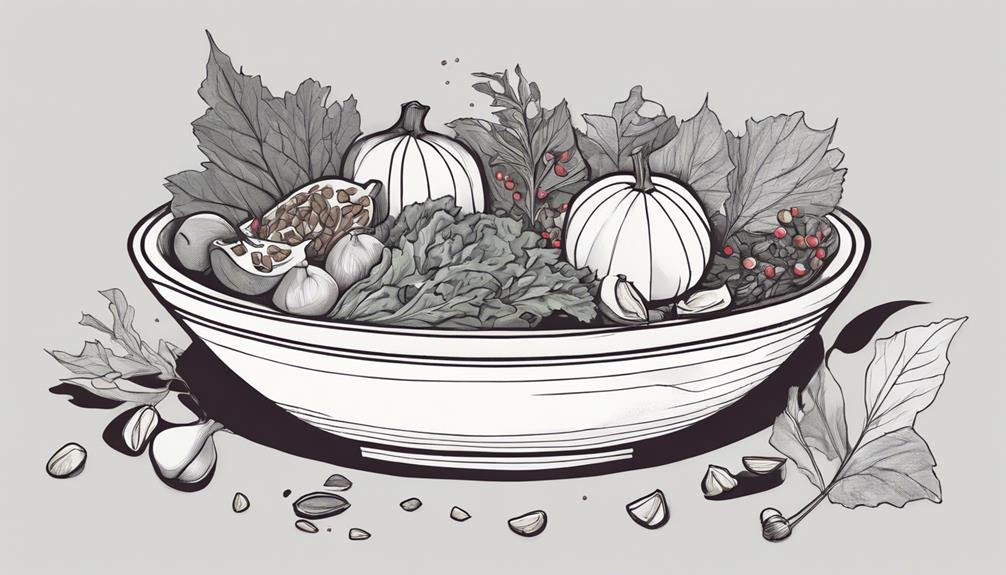
To support healthy testosterone levels, you need to focus on key nutrients that play an important role in hormone production and regulation.
Zinc is critical; it helps boost testosterone synthesis and can be found in foods like oysters, beef, and pumpkin seeds.
Magnesium also contributes by supporting muscle function and energy levels, and you can get it from leafy greens, nuts, and whole grains.
Additionally, healthy fats, particularly omega-3 fatty acids, are essential for hormone production; consider incorporating fatty fish, flaxseeds, and walnuts into your diet.
Finally, protein is important for building muscle and maintaining ideal testosterone levels, so make sure you're consuming adequate amounts from both animal and plant sources.
Prioritize these nutrients for better hormonal health.
Vitamins Supporting Hormonal Health
Vitamins play an essential role in supporting hormonal health, especially as you age and your body undergoes changes.
Vitamin D is important for testosterone production, and getting sufficient sunlight or supplementation can help maintain ideal levels.
Vitamin B6 supports the production of hormones and can help regulate mood and energy levels.
Additionally, Vitamin B12 is critical for red blood cell formation and may boost energy, which is necessary for overall vitality.
Vitamin E acts as an antioxidant, protecting your cells from damage and supporting hormonal balance.
Incorporating these vitamins into your diet can enhance your hormonal health and overall well-being.
Make sure to include foods rich in these vitamins or consider supplements if necessary for ideal results.
Minerals Essential for Men
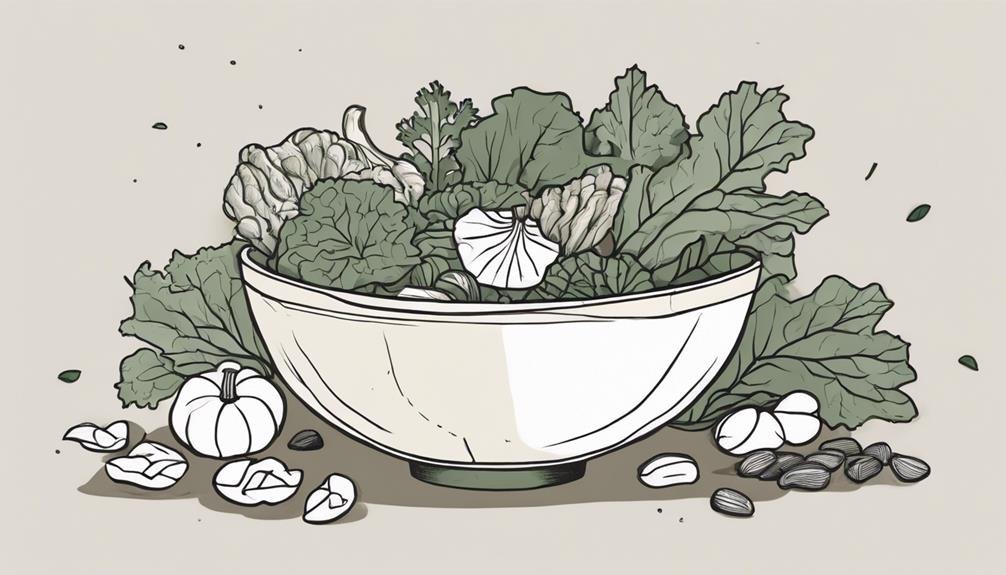
Incorporating essential minerals into your diet is important for supporting hormonal balance and overall health as you age. Key minerals like zinc, magnesium, and selenium play significant roles in maintaining testosterone levels and promoting ideal hormone function.
Zinc is necessary for testosterone production, while magnesium helps regulate cortisol, the stress hormone that can impact testosterone levels when elevated. Selenium is crucial for thyroid function, which influences metabolism and energy levels.
To get these minerals, include foods like nuts, seeds, whole grains, and lean meats in your meals. You might also consider a mineral supplement if you struggle to meet your daily needs.
Staying mindful of these minerals can help you maintain hormonal health and wellness as you move into your 40s and beyond.
Herbal Supplements for Balance
Herbal supplements can play an essential role in balancing hormones as you navigate the changes that come with aging.
Ingredients like ashwagandha, known for its stress-reducing properties, can help lower cortisol levels, which may in turn support testosterone production.
Another powerful herb is fenugreek, which has been shown to enhance libido and improve testosterone levels.
Similarly, tribulus terrestris can boost sexual health and hormone levels.
Don't overlook maca root, either; it's linked to increased energy and stamina.
Incorporating these supplements can provide your body with the support it needs.
However, it's vital to consult with a healthcare professional before starting any new supplement regimen to guarantee safety and effectiveness tailored to your individual health needs.
Lifestyle Factors Influencing Hormones

Your lifestyle choices greatly impact hormone levels, especially as you age. Regular exercise plays an essential role in maintaining hormonal balance. Aim for a mix of cardio and strength training to boost testosterone and overall well-being.
Don't underestimate the importance of sleep; inadequate rest disrupts hormone production, so prioritize quality sleep each night.
Stress management is equally important. High stress levels can elevate cortisol, which negatively affects testosterone. Incorporate relaxation techniques like meditation, yoga, or deep breathing into your daily routine.
Lastly, pay attention to your diet. Eating whole, nutrient-dense foods while limiting processed options can greatly support hormonal health.
Questions
How Do Stress Levels Affect Male Hormone Balance After 40?
Stress levels can disrupt your hormone balance, leading to lower testosterone and increased cortisol. Managing stress through exercise, mindfulness, or hobbies helps maintain hormone stability, enhancing overall health and well-being as you age.
Can Exercise Routines Influence Hormone Levels in Older Men?
Yes, exercise routines can greatly influence hormone levels in older men. By engaging in regular physical activity, you boost testosterone and improve overall hormone balance, enhancing your health, energy, and well-being as you age.
What Role Does Sleep Play in Hormone Regulation After 40?
Sleep's like a magic potion for your hormones! When you're catching those z's, your body's working overtime to regulate hormone levels. So, prioritize sleep, and watch your energy and mood soar after 40!
Are There Specific Foods to Avoid for Hormonal Health?
You should avoid processed foods, excessive sugars, and trans fats, as they can disrupt hormone balance. Limiting alcohol and high-caffeine drinks also helps maintain better hormonal health for overall well-being and energy levels.
How Can Men Track Their Hormone Levels Effectively?
Tracking your hormone levels is like steering a ship; you need the right tools. Use at-home tests, consult with a healthcare professional, and monitor symptoms regularly to guarantee you're guiding your health in the right direction.
Conclusion
In summary, maintaining hormone balance after 40 is essential for overall health and vitality.
Did you know that about 40% of men over 45 experience low testosterone levels?
By focusing on key nutrients like zinc and vitamin D, along with incorporating herbal supplements and healthy lifestyle choices, you can support your hormonal health.
Remember, small changes can make a big difference in how you feel and function every day.
So take charge of your hormone health today!

